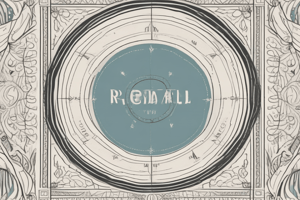Podcast
Questions and Answers
What is a key aspect of developing self-discipline according to the text?
What is a key aspect of developing self-discipline according to the text?
- Practicing mindfulness
- Creating a daily routine (correct)
- Seeking support from others
- Developing self-awareness
How does mindfulness contribute to self-discipline?
How does mindfulness contribute to self-discipline?
- By establishing a daily routine
- By seeking support from others
- By understanding strengths and weaknesses
- By avoiding distractions and staying focused (correct)
What is the role of self-awareness in personal responsibility, according to the text?
What is the role of self-awareness in personal responsibility, according to the text?
- Seeking support from others
- Practicing mindfulness
- Creating a daily routine
- Understanding strengths and weaknesses (correct)
Flashcards are hidden until you start studying
Study Notes
Accepting Personal Responsibility: The Power of Self-Discipline
Introduction
Accepting personal responsibility is a crucial aspect of self-discipline and personal growth. It involves acknowledging that our actions and decisions have consequences, and we must take ownership of our lives. This article explores the concept of accepting personal responsibility and how self-discipline plays a significant role in this process.
The Importance of Accepting Personal Responsibility
Accepting personal responsibility allows us to take control of our lives and make conscious decisions that lead to positive outcomes. It helps us develop resilience, self-confidence, and a strong sense of self-worth. By acknowledging that we are responsible for our actions, we can learn from our mistakes, grow, and improve ourselves.
Self-Discipline: The Foundation of Personal Responsibility
Self-discipline is the cornerstone of personal responsibility. It involves setting goals, making plans, and following through on them, even when it's hard. Self-discipline helps us stay focused on our objectives and prevents us from making impulsive decisions that may negatively impact our lives. By cultivating self-discipline, we can develop the mental strength and self-control needed to accept personal responsibility and make better choices.
How to Cultivate Self-Discipline
-
Set clear goals: Define your objectives and break them down into smaller, achievable steps. This helps you stay focused and motivated.
-
Create a routine: Establish a daily routine that includes healthy habits, such as regular exercise, a balanced diet, and sufficient sleep. Consistency is key to developing self-discipline.
-
Practice mindfulness: Be present in the moment and avoid distractions that can hinder your focus. Mindfulness helps you stay grounded and committed to your goals.
-
Develop self-awareness: Understand your strengths and weaknesses, and work on improving your areas of weakness. Self-awareness allows you to make informed decisions and take responsibility for your personal growth.
-
Seek support: Surround yourself with people who encourage and support your self-discipline journey. A strong support system can help you stay motivated and accountable.
Conclusion
Accepting personal responsibility is a powerful tool for personal growth and self-discipline. By taking ownership of our lives and actions, we can make better decisions, learn from our mistakes, and improve ourselves. Cultivating self-discipline is the foundation of personal responsibility, and by practicing self-discipline, we can develop the mental strength and self-control needed to accept responsibility for our lives.
Studying That Suits You
Use AI to generate personalized quizzes and flashcards to suit your learning preferences.





